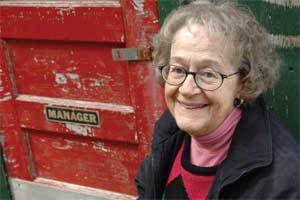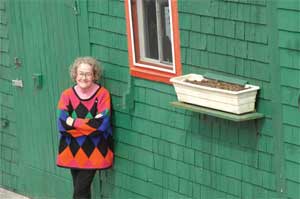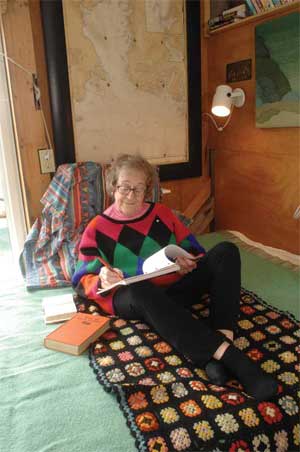 |
| Children's author Budge Wilson took on the task of writing the prequel to Anne of Green Gables. (Danny Abriel Photo) |
 In a guest editorial for the Dalhousie Gazette in 1939, Lucy Maud Montgomeryâby then beloved the world over as the writer of the Anne and Emily booksâ offered some advice for wannabe authors.
In a guest editorial for the Dalhousie Gazette in 1939, Lucy Maud Montgomeryâby then beloved the world over as the writer of the Anne and Emily booksâ offered some advice for wannabe authors.âWrite, I beseech you, of things cheerful, of things lovely, of things of good report,â she implored to a new generation of Dalhousie students.âDonât write about the pigsties because they are âreal.â Rose gardens and pine woods and mountain peaks towering to the stars are just as real and just as plentiful.â
L.M. Montgomery followed her own advice, writing of cherry trees âthickset with blossoms,â lakes of shining waters and âtremulous grassesâ in her debut novel, Anne of Green Gables. Five publishers rejected it before the Boston based L.C. Page Co. published it in 1908. It was embraced by readers a century ago and by generations ever since. A year later, L.C. Page published Anne of Avonlea, the first of seven Anne sequels.
But until now, thereâs never been an Anne prequel. Two years ago, with the Anne of Green Gables centenary approaching, Nova Scotian author Budge Wilson got a phone call from Helen Reeves, an editor at Penguin.
âOut of the blue she says, âWeâd like you to do the prequel to Anne of Green Gables. Will you do it?ââ recounts Mrs. Wilson (BA 1949, BEd 1953). Penguin was also planning a 100th anniversary collectorâs edition, a lavishly illustrated tome examining L.M. Montgomeryâs scrapbooks by Elizabeth Rollins Epperly (MA 1974).
âI was dumbfounded. I think I said something really milquetoast, like âIâd like to think about it.ââ
Her instinct was to say no. She had another book she wanted to writeâa collection of poems touching on the crash of Swissair Flight 111Â 10 years ago. The Anne task was too intimidating and she wasnât up to dealing with the legions of ardent fans who regard the beguiling, red-haired, freckle-faced Anne Shirley as sacrosanct. She also worried that L.M. Montgomery might not want her to do it.
But then she reread Anne of Green Gables, a book she enjoyed at age nine and loved all the more at 79. The lively book also contains some interesting clues about the orphan girlâs early history in Nova Scotia, a dark current of death, deprivation and hard labour. The âbald facts,â according to Anne, include her parentsâ deaths by fever, being taken in by the housekeeper Mrs. Thomas âthough she was poor and had a drunken husband,â and then handed over to another family, the Hammonds, to help care for eight children under the age of fiveâtwo wee ones plus âtwins three times in pilipiliÂț»ion.â
There are echoes of Anneâs history in L.M. Montgomeryâs own far-from-storybook life. Born in 1874 in Clifton, P.E.I., she had a lonely childhood. When she was a baby of 21 months, her mother Clara died of tuberculosis and her father left her behind to be raised by strict grandparents. He moved on to Saskatchewan and remarried.
 |
| Budge Wilson at her place in NorthWest Cove.(Danny Abriel Photo) |
As a young woman, L.M. Montgomery was flooded with marriage proposals by more than a dozen suitors. In her 30s, she finally accepted the proposal of Ewen Macdonald, the Presbyterian clergyman who came to Cavendish; writing in her journal, she wrote she felt like a âhopeless prisonerâ on her wedding day. Later, her husband suffered long bouts of mental illness that she tried to keep covered up so he could keep his job.
The pigsties in Lucy Maudâs life were real: âI read Lucy Maud Montgomeryâs journal and realized what an exceedingly unhappy life she had,â says Mrs. Wilson, now age 81.âAnne had endured a lot, too. Montgomery herself gave hints of these things but she never pursued them. I think she didnât want to do it. It was just too sad.â
But there was enough tantalizing detail in what the 11-year-old Anne reveals to the spinster Marilla to build a story and puzzle out how Anne came to be so feisty and articulate. Mrs. Wilson, like Marilla, âwas shrewd enough to read between the lines of Anneâs history and divine the truth.â
Once decided, Mrs. Wilson put pen to paper. She wrote the 71 chapters of Before Green Gables in 71 days, finishing the draft on her 80th birthday. She wrote in longhand with her arthritic handââsometimes I would hear it scrunchâ âfrom her perch on her bed, mostly in the little fish house by the shore of her home in Northwest Cove on St. Margaretâs Bay. As the pages drifted one by one to the floor by the bed, she jotted down questions for her historian husband, Alan Wilson: How did people travel in 19th-century Nova Scotia? What shoes did they wear in the winter? Had the egg beater been invented yet?
 |
| Budge Wilson writes her books in longhand. (Danny Abriel Photo) |
She also creates a bleak picture of life for women, who birthed and buried babies, scrubbed clothes, kept house, tended livestock and tilled fields in backwoods Nova Scotia. Mrs. Wilson could relate to the sense of profound isolation she creates on her pages; it wasnât all that different from when she and her husband moved to the old house in Northwest Cove in the early 1950s. There was no electricity, no running water, no telephone. Mrs. Wilson did the laundry in a galvanized tub using a plunger with holes in it. âIt was about eight years before we had running water,â she remarks. âThis stuff just didnât seem odd to me.â
But there is sunshine among the dark shadows of Before Green Gables. Mrs. Wilson picks up on the imaginary friends Anne mentions in Anne of Green Gablesâher reflection âKatie Mauriceâ in the âenchanted bookcaseâ at the Thomas house and the echo she names âViolettaâ when she escapes for fleeting moments from diaper duty at the Hammonds. She also creates new characters and fleshes them out: Miss Henderson, the schoolteacher who awakens her inquisitive mind; and the reclusive Egg Man, who gives her five new words a week in exchange for her company.
Mrs. Wilson came to love creating the book, even as she was hurried through the editing process and âclung on by my fingernailsâ to save it from drastic cuts. Then, the draft went to pre-eminent Montgomery scholar Elizabeth Rollins Epperly, who recalls opening the package with trembling fingers.
âWhat if I hate it? What if she doesnât have Anne?â says Ms. Epperly, professor emerita and former president of the University of Prince Edward Island.âFifteen pages in, I started to relax. I got really caught up in the story ⊠She had captured Anne and that was the task.â
The two authors (both Dal alumnae as was L.M. Montgomery) met while Mrs. Wilson was doing a reading in Charlottetown and conversed frequently on the phone during the writing of Before Green Gables.
âAfter I finished it, spent, I ran to the phone, you know with tears in my voice, saying âYou did it, you did it!â I hear Budge on the other end of the line, âUm, who is this?ââ
Before Green Gables was launched at the Royal Ontario Museum in Toronto last February and the backlash Mrs. Wilson dreaded never came. Even skeptical reviewers have mostly been won over, as have the fans. âI did end up liking the book more than I thought I would,â admits âAvFan4vrâ, a sentiment thatâs repeated again and again on the Avonlea Message Board. Yuka Kajihara, a member of Buttercups, the oldest and largest Montgomery fan club in Japan, says she picked up Before Green Gables fully prepared to hate it but ended up with grudging admiration for Mrs. Wilson. âProducing a biography of the early Anne must have been difficult,â says Ms. Kajihara, who runs the blog Yukazine, exploring all things Montgomery.âI appreciate her gentle, warm eyes towards adult characters whose lives appear amazingly harsh to modern readers. Like Montgomery, Wilson peppers fairy tale essences which nicely blend with realism in the story.â
Ms. Epperly believes readers of Before Green Gables will dive right back into the pages of Anne of Green Gables. âYou just hope desperately she gets someplace where sheâs going to be loved. Of course you know itâs going to happen, but itâs so wonderful to immerse yourself in that world again and realize that itâs as beautiful and as colourful as youâd like for Anne.â
